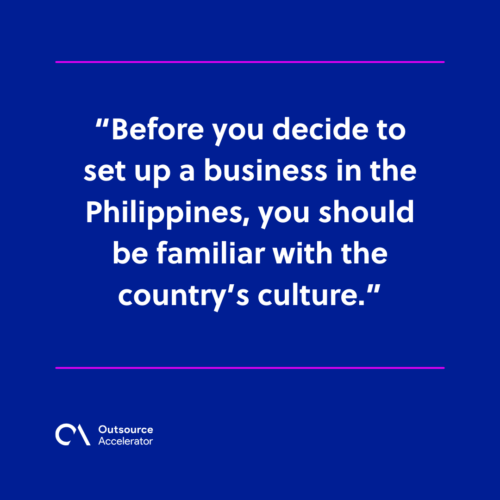Understanding the cultural nuances while doing business in the Philippines

This article is a submission by D&V Philippines. D&V Philippines has years of experience in the accounting and finance industry. This third-party services company can generate the financial reports you need to make real-time financial decisions.
The Philippines is a prime outsourcing destination because of its location in the Asia Pacific region and its skilled workforce.
Filipinos have high English proficiency, which makes them easier to train and employ because they already know the language. You can find Filipinos who can do various jobs regardless of the field, such as engineering, IT, marketing, sales, customer service, and others.
Cultural guide to doing business in the Philippines
Before you decide to set up a business in the Philippines, you should be familiar with the country’s culture.
Understanding it allows you to develop long-term rapport and sustain a strong client relationship where you can gain a competitive advantage.

Developing personal relationships
Your personal relationships with your Filipino counterparts are crucial to the success of your business endeavors. Networking isn’t just purely about business.
Don’t be surprised when a Filipino begins to ask personal questions about you, such as family, hobbies, interests, and related topics.
You can also ask similar questions about them. Small talk is part of developing a personal relationship beyond cold negotiations.
Your relationship with them enables you to get favors and might fast-track negotiations because you earned their trust.
Nuances of gift-giving
In some cultures, a gift might seem like a bribe. However, gift-giving is part of the Philippines’ business etiquette, and there are appropriate times to do so.
You can give a gift to your Filipino business partner during the early phases of your negotiations as you try to build rapport and a business partnership. With a second gift, you can conclude successful negotiations and establish a business relationship.
Indirect communication
Filipinos are fluent English speakers; however, you still need to communicate your intentions and goals clearly. Establish these before you schedule a face-to-face meeting with your potential partners.
Avoid making assumptions at the conclusion of your meeting.
Filipinos avoid giving an upfront no for an answer, especially when they have to make a decision on the spot. They might say yes to your terms now but might retract later upon further review.
They don’t want conflict or to lose face during a meeting. After the meeting, you need to follow up on your terms and details. This gives your Filipino counterparts time to assess the deal’s pros and cons.
You’ll know the negotiations are successful when you receive a written confirmation. Upon receipt, you can proceed and implement the deal’s specifics.
Keeping face in negotiations
You need to understand Filipinos’ need to save face throughout the negotiation process and even during meetings. Overeagerness or aggressiveness in getting an immediate response will create tensions and might hamper your prospects of getting a deal done.
A ‘yes’ doesn’t necessarily mean ‘yes’ in such a straightforward manner. You’ll have to follow up to get the actual answer to your business proposal.
Be courteous and polite during meetings. Hierarchy is observed and followed. Identify who to address and their rank in the company you want to partner with.
Avoid conflicts and direct confrontations when dealing with your Filipino business partners. Friendly banter might be a sign of avoiding conflict and saving face.
Use connections wisely
Your connections in the country hinge on your chances of setting up a high-level meeting with key decision-makers. Someone has to vouch for you when you want to do business in the Philippines.
You’ll need a contact to introduce you. Once you establish this relationship, the negotiations can move quickly and seamlessly.
Building personal and business relationships with Filipinos takes time. You’ll need to invest time and effort to succeed in this endeavor.
To be late or not
Filipinos have this concept called “Filipino time,” wherein people set a schedule but arrive later than the expected time.
You need to provide leeway for such things when partnering with Filipinos or arranging a meeting for the first time. However, the acceptable time for lateness is around 15 minutes.
Understand the hierarchy
Many businesses in the Philippines are family-owned. Understanding the hierarchy is important when you want to partner with them.
Members of the family hold different positions within the organization. You’ll need a common contact to initiate negotiations or at least get a meeting.
Once you establish the initial meeting, you can build a relationship.
If the company you plan to form a partnership with isn’t family-operated, you’ll still need a connection with the decision-makers.
FAQs of doing business in the Philippines
Companies that decide to establish a presence in the Philippines can leverage various advantages. These allow them to reduce costs, maximize resources, and boost profits.

What are your incentives for doing business in the Philippines?
Now that you’re familiar with the cultural nuances of partnering with Filipinos, doing business in the Philippines comes with multiple benefits.
Consider PEZA accreditation if you plan to establish a company in the country.
The government of the Philippines established PEZA in the mid-1990s. It has empowered PEZA to provide support to foreign-owned companies.
When you get accredited, you’ll have access to incentives such as:
- Up to seven years of income tax holidays for accredited companies
- VAT exemptions on imports
- Accreditation allows companies to hire foreign employees
- Land lease terms that span decades
- Import-export activities have simplified procedures
- Visa support for foreigners and their dependents
These are some of the incentives for acquiring PEZA accreditation. However, you’ll need to meet certain factors and requirements to get accredited.
You’ll need to partner with a knowledgeable and experienced firm in the Philippines to avoid or at least reduce the problems you’ll encounter.
What activities qualify for PEZA accreditation?
Some of the activities that can benefit from PEZA include:
- Export manufacturing
- Information technology service exports (e.g., call centers, BPO, software development, programming, and e-commerce)
- Sports and recreation centers and facilities, accommodation, and special interest activities and attractions aimed at foreigners within PEZA Tourism Special Economic Zones
- Department of Health endorsed medical services with foreigners as primary clients/patients
- Utilities that provide power and light and supply and distribute water within special economic zones
Learn more about which activities qualify when you visit this website.
What are the requirements for PEZA accreditation?
You’ll have to submit these requirements before getting accredited:
- Application form
- By-laws
- Articles of incorporation
- Project feasibility study
- Board resolution authorized company representative and signatory
- Secretary’s certificate that authorizes application for PEZA registration







 Independent
Independent




